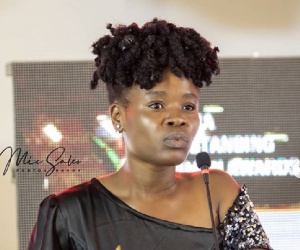- Home - News
- TWI News | TV
- Polls
- Year In Review
- News Archive
- Crime & Punishment
- Politics
- Regional
- Editorial
- Health
- Ghanaians Abroad
- Tabloid
- Africa
- Religion
- Election 2020
- Coronavirus
- News Videos | TV
- Photo Archives
- News Headlines
- Press Release
General News of Saturday, 3 October 2015
Source: GNA
Parliament concerned about youth radicalization – MP
 Fritz Barffour
Fritz Barffour
Mr Fritz Barffour, Chairman, Parliamentary Select Committee on Defence and Interior, says the committee is concerned about the proliferation of small arms and the potential radicalization of the youth.
He said the proliferation of small arms was one of the major causes of conflicts in some parts of the country, which had resulted in the loss of lives and the destruction of properties.
Mr Baffour said this on Wednesday at a day's round-table organized by the Foundation for Security Development in Africa (FOSDA), a security and development oriented NGO to mark the celebration of the UN Day in commemoration of the abolishing of nuclear weapons, which is marked annually on September 26.
He expressed concern about the porous nature of borders across Africa, which makes it easier for people to smuggle arms from one end to the other to create troubles.
He called for the creation of jobs for the youth to stop them from joining radical groups.
He noted that, although Ghana is small, it could do a lot to ensure that nuclear weapons were banned by lobbying other African countries to add their voices to the call on the ban on weapons of mass destruction.
Mr Baffour, who is the Member of Parliament for Ablekuma South, said due to Ghana’s commitment towards nuclear free world, the country in the 1960s organized an international conference dubbed, “Stop the Bomb” to draw the world’s attention to the need to abolish nuclear weapons.
Ms Amina Montia, Board Member, FOSDA, noted that, in the last 10 years, a number of accidents and security breaches in the US and the North Atlantic Treaty Organisation (NATO) nuclear facilities had uncovered an extremely worrisome state of affairs.
“Given the lack of transparency and accessibility of information on the world’s nine nuclear weapon states including the US, UK, Russia, North Korea, India among others, these incidents could very well be the tip of the iceberg”, she added.
She intimated that recent data on the magnitude of the consequences of nuclear weapons, paired with the failure in ensuring the safety of nuclear arsenals, had increased the urgency of finding a way to address the catastrophic humanitarian threat that nuclear weapons posed.
She called on Government to use every opportunity available to rally African states and take leadership role in the call for a treaty in Africa on the end to end nuclear weapons.
“Ghana and most African States do not produce or possess nuclear weapon, however, we should not settle for the current status quo, which puts the world at risk of humanitarian catastrophe of unimaginable proportion”, she added.
Mr Mahama Saladin, Disaster Management Coordinator, Ghana Red Cross Society, called on the world to embrace the call to end the nuclear race among developed countries to avoid a potential repeat of the disaster, which struck Hiroshima and Nagasaki in Japan, leading to the death of over 28,000 in 1945 to weapons of mass destruction.
He noted that, even though Hiroshima and Nagasaki were bombed over 70 years ago, people are reported to be still suffering the health implications of the bombing.
He cited loss of human lives, the breakdown of the central nervous system, the destruction of the body’s’ capacity to produce new blood cells, uncontrollable bleeding, depletion of the ozone layer among others as some of the negative effects of the use of nukes.
Mr Leonard Tettey, Programmes Officer In Charge, Treaty Implementation, Ghana National Commission on Small Arms, called for a concerted global effort, especially, among the developed countries, to ban nukes to ensure a safe world for all.
“While developing countries are investing in poverty reduction measures, developed countries keep investing heavily in nuclear weapons, which does not augur well for the safety of all”, he said.
He said since 1968, groups, countries and individuals had all joined the call for the banning of nukes and yet not much had beer about it.
Some of the organisattions, which participated in the round-table discussion, include the Ghana Red Cross Society, the Ghana Armed Forces, the National Disaster Management Organisation (NADMO), the Ghana Atomic Energy Commission (GAEC, the Ghana National Commission on Small Arms and civic societies.









